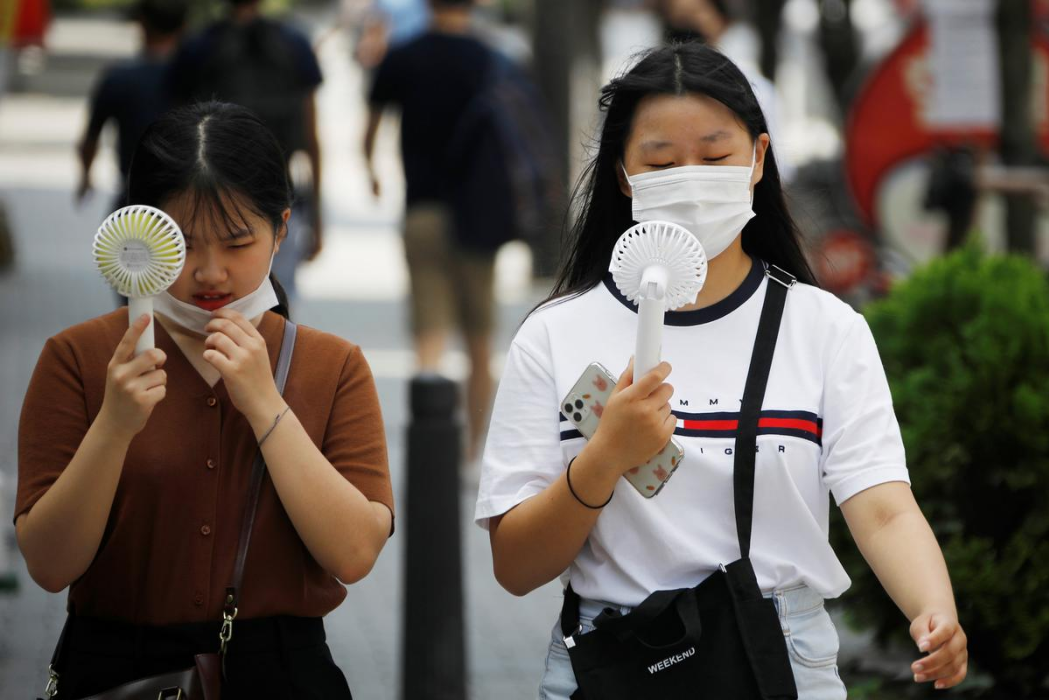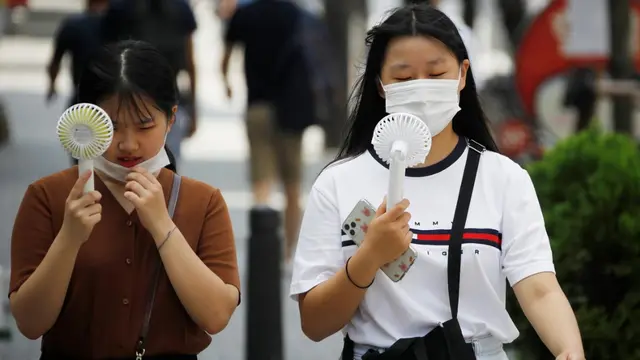Editor's note: This is the 98th article in the COVID-19 Global Roundup series. Here is the
previous
one.
The whole world has gone through a "major lockdown" this spring reaching to the point when about half of the world's population was under some form of restriction orders. Now that some have seen another spike in coronavirus infections, governments from different countries hold their attitudes towards the lockdown policy differently.

Women wearing masks to prevent the spread of the coronavirus use portable fans to cool down in Seoul, South Korea, August 20, 2020. /Reuters
South Korea announced on Saturday that the government decided to expand Level Two social distancing guidelines nationwide starting Sunday. And if this attempt to curb the coronavirus failed, it will consider heightening its social distancing guidelines to the highest level as it battles
a new outbreak
of the disease spreading from the capital, Seoul.
The Korea Centers for Disease Control and Prevention (KCDC) reported 332 new domestic coronavirus infections on Saturday, the most for a single day since March 8 when 367 new cases were recorded. All of the country's 17 major cities and provinces simultaneously reported infections for the first time since the country reported its first case in January.
South Korea used advanced contact tracing and widespread testing to contain its first outbreak of the novel coronavirus. But the Asia's fourth-largest economy has experienced persistent outbreaks in recent weeks and now has come to a point to pause many of its economic activities again.
In Seoul and some surrounding cities, the government has reimposed social distancing rules, including restricting large gatherings while closing nightclubs, karaoke bars, buffets and cyber cafes.
"If we don't curb the spread (of the virus) in early stages, this will grow as a large-scale wave. To us, there is nothing more important than focusing on responding to COVID-19," Health Minister Park Neung-hoo told a briefing on Saturday.
In Europe, France, Germany and Italy have experienced their highest daily case counts since the spring, and
Spain
finds itself in the midst of a major outbreak.
However, some European leaders are reluctant to impose widespread lockdowns, and are instead relying on measures like targeted restrictions on movement in hot spots, tightened mask requirements and public health education campaigns.
In Germany , Chancellor Angela Merkel has vowed to tackle the spread of the virus without closing national borders, despite a rise in daily infections not experienced since the end of April.
"I don't think we're just going to close the borders again," she said. "Politically, we really want to avoid that at all costs."
Finance Minister Olaf Scholz said on Friday that Germany will need to take on yet
more debt in 2021
to mitigate the impact of the coronavirus epidemic on the economy. The country cannot afford another halt on the economy.
In France , President Emmanuel Macron has ruled out another countrywide lockdown, opting instead for "
very localized strategies
."
"We cannot bring the country to a halt, because the collateral damage of confinement is considerable," he told Paris Match magazine this week, adding that "zero risk never exists in a society."
However, travelers from France to the United Kingdom will be required to self-certify that they are not suffering coronavirus symptoms or have been in contact with a confirmed case within 14 days preceding travel, the British government said on Friday.
Other countries including **Spain, the Netherlands, Belgium, Croatia and Austria **are also on the government's quarantine list, while on the other hand Portugal was removed from it and now travelers from there are not required to quarantine.
(With input from agencies)
 简体中文
简体中文





